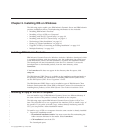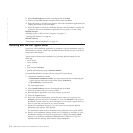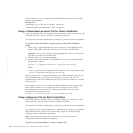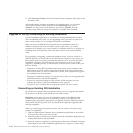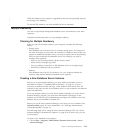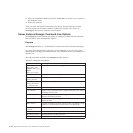
Setting Up Cluster Installations
Complete the following tasks to cluster two computers.
v “Cluster Installations”
v “Overview of Implementing a Cluster on Two Nodes”
v “Setting Up a Cluster Installation” on page 2-10
v “Preparing to Set Up a Cluster” on page 2-10
v “Implementing a Cluster on the Primary Node” on page 2-11
v “IDS as a Cluster on the Secondary Node” on page 2-11
v “Installing IDS as a Cluster on the Secondary Node” on page 2-11
v “IDS as a Cluster on the Secondary Node” on page 2-11
Cluster Installations
IBM Informix Dynamic Server supports Microsoft Cluster Server (MSCS), which
enables high availability on Microsoft Windows (Windows 2003, Windows XP and
Windows Vista). MSCS allows you to cluster two Windows computers as
redundant components, or nodes. When a failure occurs on one node in the cluster,
Windows restarts the failed applications (such as the database server) on the
surviving node in the pair.
MSCS includes the Cluster Administrator, which enables you to designate a cluster
and define resources, resource ownership, and dependencies on other resources. A
resource is a hardware component, such as a shared disk, or a software
application, such as the database server, that is shared between the two nodes in a
cluster.
The Cluster Administrator also enables you to define groups that specify resource
dependencies, so that the Microsoft Resource Manager can move groups of
dependent resources to the surviving node in the event of failover. The Microsoft
Resource Manager is a program that invokes specific start, restart, stop, and
monitoring functions for a resource.
You can install IDS either on one node of a cluster or on both nodes (in a fail-safe
mode). Installation on one node of a cluster is the same as regular installation on a
stand-alone computer. For more information about installing IBM Informix
Dynamic Server, see “Installing IBM Informix Products” on page 2-1.
Important: Stop IDS before shutting down the operating system during MSCS
setup to avoid any data loss.
Overview of Implementing a Cluster on Two Nodes
After you complete cluster-implementation preparation tasks, you implement IBM
Informix Dynamic Server in a cluster environment in three steps:
1. Install IBM Informix Dynamic Server on the primary node.
2. Install the ClusterIT utility.
3. Convert the database servers to a cluster configuration. This step is
implemented with the ClusterIT utilities:
v Use the clusterIT_a utility to configure IDS on the primary node for use in a
cluster.
v Use the clusterIT_b utility to install IDS and configure it for use in a cluster
on the secondary node.
Chapter 2. Installing IDS (Windows) 2-9



